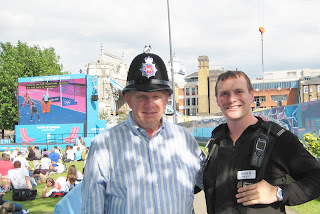It always gets to me when a Brit says “I really like your
accent.” What accent? Well, Constable Rod Barton had an accent, strong cockney
I think, and he was talking to me but I couldn’t understand much at first. It was something about a hat. Finally he took off his distinctive
headdress and placed it on my head. Very slowly, he said “You Americans like
our hats, don’t you? I thought you might look good in mine.”
 I did feel taller with the hat. And, without it, he looked shorter. His
partner grabbed my camera and shot this picture of us, with a big smile on her
face. It was sort of an odd incident but it did give me the chance to chat with
Constable Rod about security at the Games.
I did feel taller with the hat. And, without it, he looked shorter. His
partner grabbed my camera and shot this picture of us, with a big smile on her
face. It was sort of an odd incident but it did give me the chance to chat with
Constable Rod about security at the Games.
They were part of the 10,000 strong London Police force that
was directing security for the Games.
Much was made of the subcontracting snafu with G4S, the world’s largest
private security firm and, most of the criticism of the bureaucrasy seemed warranted. However, it
was very clear that security operations were being led by the London Police and they were a buttoned-up bunch.
My little communications piece of the Games was concerned about
security all along. Most of our
conference calls were about security and dealing with its effects on public
perception. I should say here at the outset that there was no incident of
significance throughout the Games and the joint forces who made up the first
responders were professional and most effective.
 The Constable and his partner were part of the street force
that worked three shifts a day keeping order throughout the city. Most of their
time was spent chatting with visitors, getting their pictures taken and controlling
any situation that might become unruly.
The Constable and his partner were part of the street force
that worked three shifts a day keeping order throughout the city. Most of their
time was spent chatting with visitors, getting their pictures taken and controlling
any situation that might become unruly. I even tested one of the officers at Buckingham Palace on
details of the triathalon that was about to finish nearby in Hyde Park. He had the answers and the specifics. I asked
him how he knew so much about it and he responded with “That’s my job.” I’ll buy it.
I even tested one of the officers at Buckingham Palace on
details of the triathalon that was about to finish nearby in Hyde Park. He had the answers and the specifics. I asked
him how he knew so much about it and he responded with “That’s my job.” I’ll buy it.The G4S contractors mostly worked at the venues, with a focus on the Olympic Park. Access there was tightly controlled, using airport scanning tactics. It worked effectively and I saw the lines moving along and the visitors being cooperative.
Most of the estimated 13,500 military troops who were called
up were serving as back-up from my viewpoint.
They were visible but not active.
I’m sure there were places where the role of the military was more
evident but not in the high profile locations such as the Olympic Park. And that was a smart move, in my
estimation.
There were security monitoring stations and headquarters
spread around the city and in all the venues.
The one that I saw was near the International Media Center and pretty scary,
high-tech looking. At least one-step-beyond NCIS. It gave me confidence.
 Even the much talked-about "roof-top rockets" ended up only being one launcher on a single residential block. Other military hardware available for anti-terrorist purposes did included Eurofighter jets and surface-to-air missiles, which frankly, I was glad to know about.
Even the much talked-about "roof-top rockets" ended up only being one launcher on a single residential block. Other military hardware available for anti-terrorist purposes did included Eurofighter jets and surface-to-air missiles, which frankly, I was glad to know about.
Far and away, the only crises we encountered were business
related. Empty seats in the venues,
merchandise being pirated, counterfeit money being circulated and athletes not
getting their way…only occasionally. It
could not have gone smoother.
Constable Rod said that having a million extra people on the streets of London made it a bit harder to keep peace at times. However, a few more “pub tumblers” were something they knew how to handle. “We're here to keep things together. Better to be safe than sorry, I think you say. You Americans are just one of the visiting countries and we’re glad you’re all here. The Olympics is a winner for Great Britain and we’re proud.” Well said, Constable.
More tomorrow…



No comments:
Post a Comment